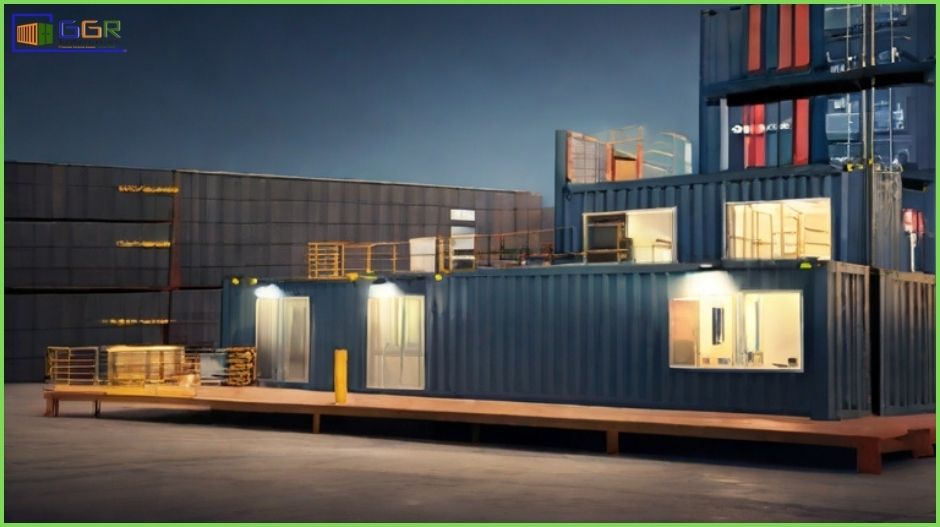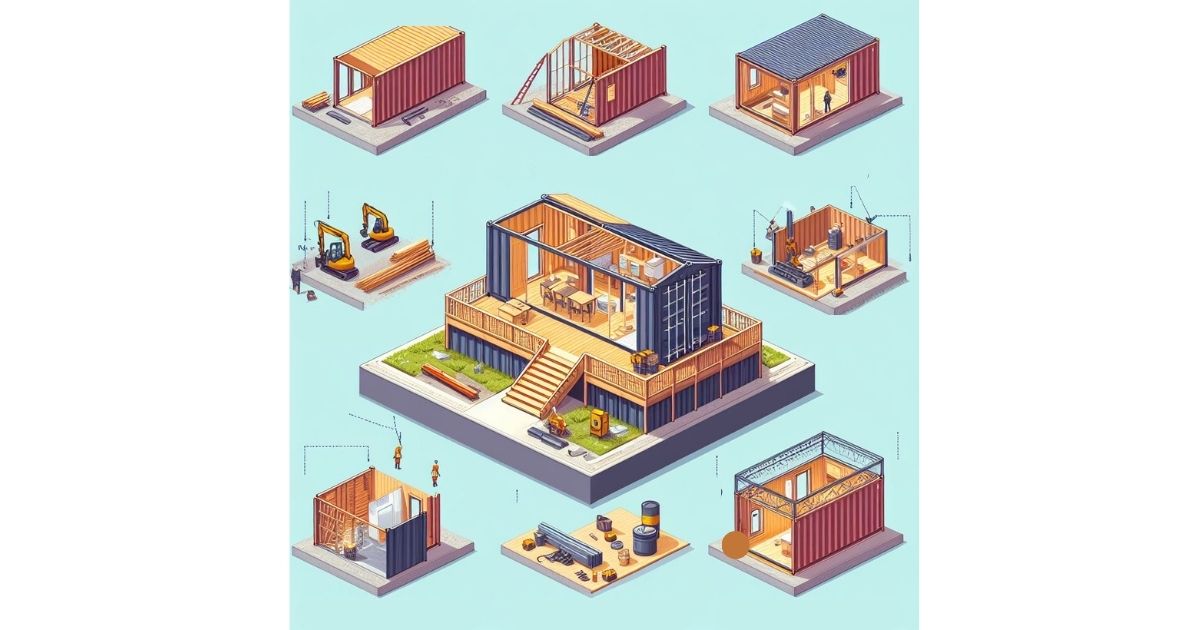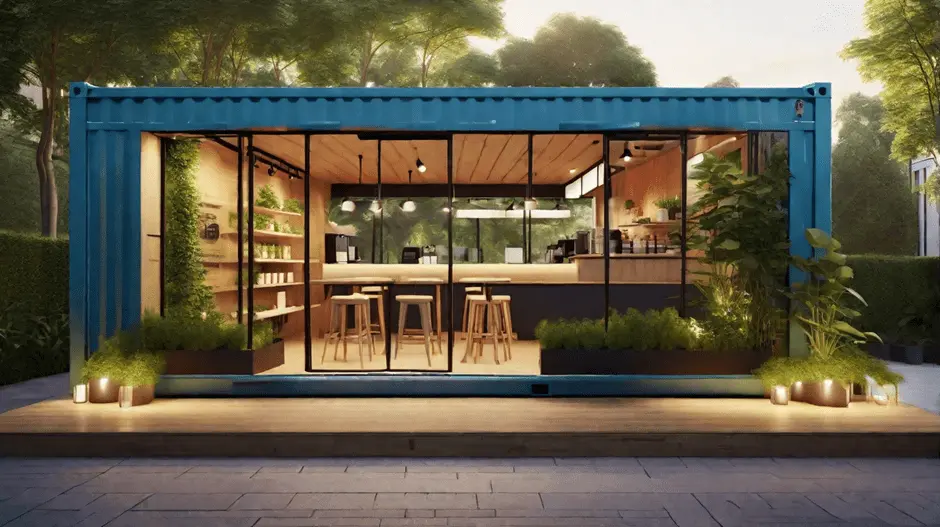Introduction to Shipping Container Homes

The idea of living in container homes has changed the way we build houses, giving a new and green method to make home designs. These houses smartly use old shipping containers and change them into places to live. They can be used for many ways of life that people like. This major idea has become popular all over the world because of its built-in benefits. This sustainable practice is reshaping the way individuals build homes: How to Build a Shipping Container Home.
Understanding the Concept
Shipping container homes, also known as modular or prefab container homes, live the idea of reusing and living green. These places are made by changing shipping containers - strong steel containers mainly used for moving goods like boats, trains, and trucks. These containers can be changed in many ways to become living spaces. They are good for small houses or big homes made up of several containers.
Advantages of Container Homes
People like modular container homes because they have many good things going for them. Firstly, they give a green choice by using extra containers from shipments. This lessens the harm to nature and supports lasting power in our world. Furthermore, prefabricated container homes usually cost less than regular buildings. They often give a cheap place to live. Their strong steel structure gives them automatic power and strength against bad weather, making them a good place to live in different climates.

Designing Your Own Container House
The process of making a home using a container starts with careful planning and thoughtful design.
Factors to Consider Before Starting
Before starting starting Shipping container home construction, it's important to think about a few things. Look at how much space you need, what kind of life you want to live, and any special things your house should take care of. Things like how many people will be using the space, what they want to have inside it, and why are going there affect how it's built.
1. Planning the Layout and Spaces Inside a Building
Making the shape and space inside your cargo container home is very important. Find the best way to set up containers, thinking about their placement and connection so they can make living areas that work well. The design should focus on using space well while fitting your preferred way of living and liked looks.
2. Acquiring and Preparing Containers
Finding the right containers is very important to make your project successful.
3. Finding Suitable Containers
Finding containers to change requires looking up local sellers, checking online stores, or contacting mail carriers. Check the size, shape, and strong build of containers to make sure they are right for your project.
4. Inspecting Containers for Conversion
Check big containers carefully for any broken parts, rust, or other problems that could make them bad to turn into something else. Search for strong, waterproof containers without a lot of rust or dents. This will make sure your future house has a good base to start on.
Site Preparation and Foundation
Getting ready and making a strong base are very important parts when building something.
1.Clearing the Building Site
Start by cleaning the chosen building area. Get rid of trash, plants, and anything that could stop building. Make the ground flat so it's a good and even base for the containers.
2.Different Foundation Options
Choosing the right foundation is important based on things like ground type, weather, and local rules about building. Usual base choices include using concrete slabs, pier foundations or even making the containers' corner castings into structure points.
3.Modifying Containers
Changing cargo containers needs care and thought to keep the strength of the containers strong.
4.Marking and Cutting Openings
Note where doors, windows, and other gaps should be on the containers. Use special tools like plasma cutters or angle grinders to carefully cut the steel walls. Getting the cutting right is very important for keeping a container strong.
5.Reinforcing Structural Integrity
After you make the needed holes, strengthen the box's shape. Join steel rods or supports around the cuts in openings to make sure the box's strength stays good.
6.Structural Reinforcement and Insulation
Make the box stronger by putting in extra help beams or support, especially at points where it has to carry heavy things. Cover the walls and ceilings of the box to keep temperatures inside steady, and use less energy.
7.Installing Utilities
Setting up utilities is an important part of making the freight container homes liveable.
8.Plumbing Considerations and Installation
Make a plan for where to place plumbing things and then put in systems for water and drainage, making sure everything works right. Talk to experts if you need help with complex plumbing setups.
9.Electrical Wiring and HVAC Systems
Put in the electric wires by following safety rules and laws. Put in HVAC (Heating, Ventilation and Air Conditioning) systems to make sure the container home is comfortable.
10.Interior Finishing
Finishing the inside means putting in the last little details so you can make a nice place to live.
11.Flooring, Walls, and Ceilings
Use floor materials and decorate inside walls and ceilings as preferred in your design. Pick materials that match the wanted look and use of the area.
12.Customization and Furnishing
shipping container house construction is more special by adding furniture, decorations, and things that work well with how you like to do stuff. This will save space too!
13.Applying Interior Finishes
The final stage of the inside work makes your container house even better, making it cozy and nice to look at.
Flooring, Walls, and Ceilings
Put in the picked flooring things like wood, laminate, or tiles. End inside walls and ceilings with paint, wallpaper or paneling to match your favorite look.
Customizing the Interior Design
Make your home in a container look good inside by putting in furniture, decorations and things that can help make space better. These should match the way you live your life.
Exterior Finishing and Weatherproofing
Keeping your home's outside safe is very important for its strength and looks.
Weatherproofing Strategies
Use weather-proof paint or coverings on the outside parts to keep them safe from wetness, rust, and damage. This makes sure your container house lasts a long time even with different types of weather.
Enhancing Aesthetics
Think about things like cladding, siding, or painting on the outside to make your container house look better. Making a look good and useful together makes the outside nice.
Tips for Comfortable Living
Look at ways to use space better, make your container home comfy and keep it running smoothly.
Budgeting for a Container Home
Talk about ways to create a budget, how much everything will cost and things that change the total costs of making a container house.
Conclusion
The homes build from shipping containers is an interesting trip that mixes creativity, being good to the environment and having your own style. These homes made from old shipping containers provide an amazing mix of being good for the environment, not costing a lot and how they look can be changed.
Going from knowing what containers are to making a plan, getting them, and changing as needed is something that needs thoughtful choices and careful actions. Making the area ready, putting down a base, and finishing inside are very important. They change these steel buildings into nice places where people can live comfortably.
GGR Enterprises
+919003132377 Location: No: 1880-B, 3rd Main Road, Mathur MMDA (Near to Manali Bus Depot), Chennai - 600 068, Tamilnadu, India.